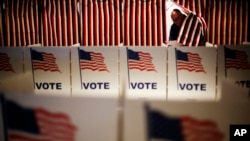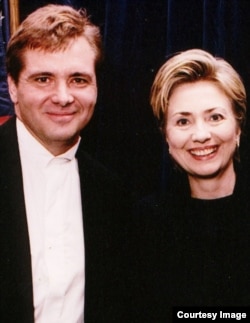Way back in March 2000, when the Internet was still in its adolescent growth spurt, the Arizona Democratic Party allowed its members to vote in the presidential primary one of three ways: in person, by mail, or via the Internet.
It was a daring move at a time when many people's web experience was little more than a dial-up modem. But it proved wildly successful. According to the Congressional Research Service, some 37,000 Arizona Democrats voted online in the primary. Another 20,000 or so voted by mail, with 20,000 others physically voting at polling stations.
A near doubling of primary turnout was seen as a great boost to the company that oversaw the vote, Election.com, and to the concept of web-based elections. But in the years that followed, few states showed much interest in the technology, and the Arizona vote was chalked up as a one-time event.
As the then-CEO at Election.com, Joseph Mohen says this year's successful Utah vote, using blockchain technology, may re-energize the public to start pressing for greater online voting options.
Mohen sat down for an interview with VOA.
VOA: Because it was so new, was it hard to convince (Arizona) election officials to give it a try?
Mohen: Because Arizona at the time was still subject to Department of Justice oversight by the Voting Rights Act, we had to do an extraordinary amount of work to convince officials and civil rights leaders that nobody would be disenfranchised in this.
We educated low income residents, Latino voters, African-American voters, and Native American voters. We had vans driving around Phoenix, communications media in Spanish and translated our material into Navajo and Apache. One-third of the land in Arizona is native land, and native voters make up a significant block of the electorate. But at that time, one-third of all native voters lacked electricity, so we really had to jump through hoops to make sure all eligible voters had every opportunity to vote.
VOA: How did it work, and how did you guarantee vote safety and accuracy back then?
Mohen: In 2000, we already had some experience with online voting systems. What we were able to do is use the technology we had — fairly sophisticated encryption and a proprietary technology — to build our own system. My understanding is that the Utah caucus cost about $180,000; we spent about $7.5 million in 2000.
VOA: That's several magnitudes more expensive …
Mohen: Remember, we had access to that kind of money because of the dot-com bubble. The Internet was totally changing the world. There was plenty of money flowing.
We also had an extraordinary amount of help from a Who's Who of the Internet back then. Cisco made their team available, and it was them that helped deflect attempted DDoS (denial of service) attacks. KPMG reviewed all our systems; Verisign invested in our company and provided us assistance with digital certificates.
The only luminary in the Internet business that refused to help us was Apple. Steve Jobs wouldn't even allow his secretary to talk to us. So to get help with Mac security issues, we went to Microsoft who was Apple's biggest shareholder, and Microsoft helped us understand the Mac encryption issues. So when you add in all the help we received from the industry, it was a lot more than 7.5 million.
VOA: How did the vote go? I read there were some DDoS attacks.
Mohen: We took every county database of every registered democrat in Arizona — something like 850,000. Every registered voter had another month to register and update their information. After that, everyone was given a PIN. When it came time to vote, the voter had to supply the PIN and also verify personal information.
Of course we had denial of service attacks. Every pizza shop that ever set up a website has had a DDoS attack. But that doesn't mean ‘let's go home and go back to paper.'
I think we had 80 million hits on the website the first day, because everyone all over the world knew it was going on. So that first morning, the system was slow. By about lunchtime, with Cisco's help, all that cleared up. We got good at it.
Now, compare that with what happened this week in Arizona, and what will undoubtedly happen somewhere this fall. In some cases, there was a five-hour wait to vote. Five hours! And the state cut the number of polling places. In Mississippi, they cut the number of polling places, and people have to travel sometimes half an hour to vote. How do you do that in a rural area if you don't have a car, or have to work, or are a single parent?
VOA: But are online systems really trustworthy when it seems like everything these days is getting hacked?
Mohen: Today we have blockchain technology — it's the same technology that underlies Bitcoin. That technology is virtually hack-proof; it's so hacker-proof that NASDAQ and the New York Stock Exchange are moving all their trading systems over to blockchain. I'm really very impressed with what they did in Utah, and their forward thinking and courage.
VOA: What would you say to me if I was a voter, or an election official, and I had worries about voting online?
Mohen: State, county, and local elections on paper in the U.S. — they're probably being hacked all the time already. There are challenges to a manual system and to an online system. My point is that you have to look at the totality of a system and not be afraid of the new, just because you're afraid of it or you fear there potentially may be a problem.
Look at 2000. We held a successful online vote in Arizona — doubled primary turnout. Then a few months later, we had a failed national election using old technology. The margin of victory was 537 votes, and I guarantee the margin of error was exponentially higher, so that entire election failed.
Imagine all the consequences that followed from that election, and no-one will ever know who really won by votes cast.
You know another election then-U.S. Secretary of State Hillary Clinton and EU leaders say was hacked? Russia — Putin's recent [2012] re-election victory. Putin hacked the ballot in Russia. Would he have won anyway? Who can say? If we had blockchain technology doing the elections in Russia, it wouldn't be hackable.
VOA: So, if Internet voting now is so reliable and combats fraud, why aren't we seeing more of it?
Mohen: There's a simple reason why it isn't going to happen soon in the U.S., although it may in some other countries: Incumbents get re-elected, generally at very high rates. The entire voting process favors incumbents. It's set up to discourage people who don't ordinarily vote from voting.
When early voting was implemented in Texas and North Carolina, incumbents got voted out. Guess what happened? They got rid of early voting. Power preserves itself at all costs.
Internet voting works. We've proven it. It's virtually un-hackable with blockchain. It's available to jurisdictions that want it. However, people have to remember once it's allowed, incumbents aren't likely to get re-elected at the same rate, so it will fundamentally change the power structure.
But because it's those incumbents who will make the decision to allow internet voting, don't hold your breath. It's not a security issue, it's about keeping incumbents in power.






